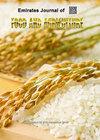Isolation and identification of phosphate solubilizing microbes in the rhizosphere of maize by sound exposure
IF 0.7
4区 农林科学
Q3 AGRONOMY
引用次数: 0
Abstract
Phosphorus (P) is a macronutrient requirement by plants. P elements applied to the soil are quickly deposited into an insoluble form. Insoluble P in the soil can be converted into available P by phosphate solubilizing microbes. One of the factors that affect the activity and growth of phosphate solubilizing microbes is sound. This study aims to isolate and identify phosphate solubilizing soil microbes in the rhizosphere of maize by sound exposure. The research was conducted by sound treatment and without sound of Al-Quran recitation in the rhizosphere of maize, then isolated and identified the phosphate solubilizing microbes. The research results obtained 11 isolates consisting of three isolates of fungi and eight isolates of bacteria. Fungi isolates found on sound-exposure soil. Subsequently, the highest microbes of phosphate dissolution index and growth curve after the sound exposure will be identified. The results of identification using the PCR-16S rRNA sequencing method showed the phosphate solubilizing bacteria isolate TSB1 was Burkholderia contaminants, TSB4 was B. latens, SMB2 was B. cepacia, and SMB4 was Burkholderia sp. Phosphate solubilizing fungi SMJ3 isolate was Talaromyces muroii and SMJ6 was Talaromyces sp. The growth curve of the phosphate solubilizing bacteria showed a different pattern, likewise phosphate solubilizing fungi. Keywords: Isolation; Identification; Phosphate Solubilizing Microbes; Sound通过声音暴露分离和鉴定玉米根圈中的磷酸盐溶解微生物
磷(P)是植物所需的一种宏量营养元素。施入土壤中的磷元素很快就会以不溶解的形式沉积下来。土壤中的不溶性磷可以通过磷酸盐溶解微生物转化为可用磷。影响磷酸盐溶解微生物的活性和生长的因素之一是声音。本研究旨在通过声暴露分离和鉴定玉米根圈中的磷酸盐溶解土壤微生物。研究通过在玉米根圈进行声音处理和不进行《古兰经》诵读声音处理,然后分离和鉴定磷酸盐溶解微生物。研究结果获得了 11 个分离物,包括 3 个真菌分离物和 8 个细菌分离物。真菌分离物发现在声暴露土壤中。随后,将对声音暴露后磷酸盐溶解指数和生长曲线最高的微生物进行鉴定。利用PCR-16S rRNA测序法进行鉴定的结果表明,分离出的磷酸盐溶解细菌TSB1为污染伯克霍尔德菌,TSB4为B. latens,SMB2为B. cepacia,SMB4为Burkholderia sp;分离出的磷酸盐溶解真菌SMJ3为Talaromyces muroii,SMJ6为Talaromyces sp。 关键词分离;鉴定;磷酸盐溶解微生物;声音
本文章由计算机程序翻译,如有差异,请以英文原文为准。
求助全文
约1分钟内获得全文
求助全文
来源期刊

Emirates Journal of Food and Agriculture
AGRONOMYFOOD SCIENCE & TECHNOLOGY&nb-FOOD SCIENCE & TECHNOLOGY
CiteScore
1.80
自引率
0.00%
发文量
18
期刊介绍:
The "Emirates Journal of Food and Agriculture [EJFA]" is a unique, peer-reviewed Journal of Food and Agriculture publishing basic and applied research articles in the field of agricultural and food sciences by the College of Food and Agriculture, United Arab Emirates University, United Arab Emirates.
 求助内容:
求助内容: 应助结果提醒方式:
应助结果提醒方式:


